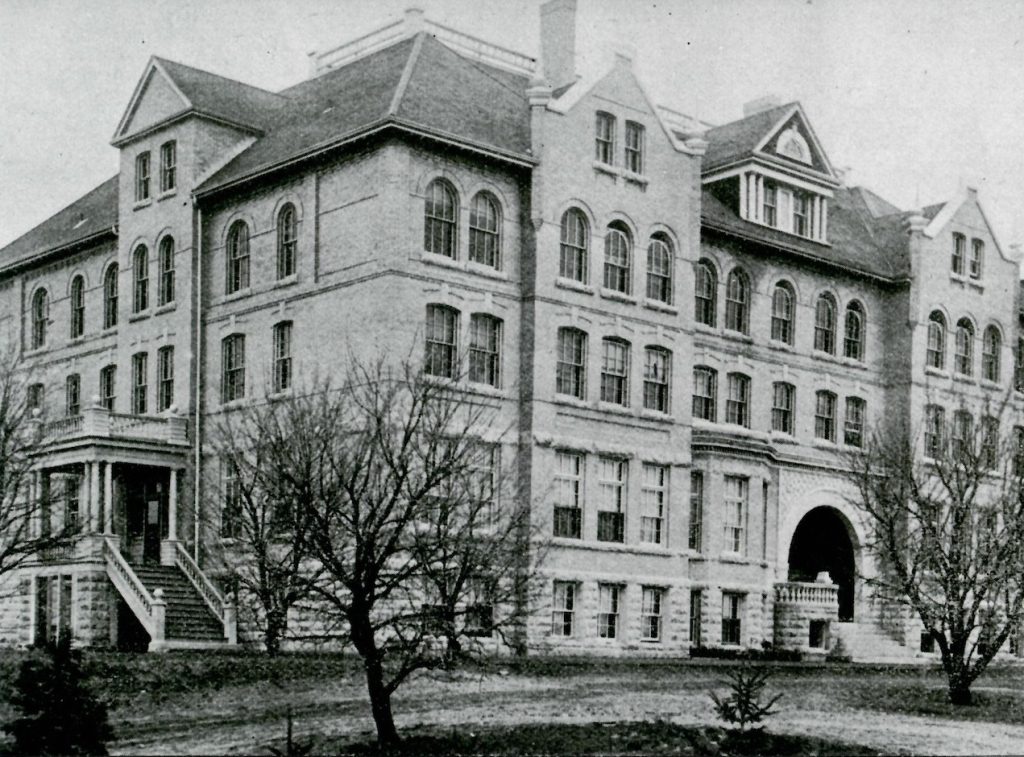Let’s talk mental health: a thoughtful exhibition
The idea of this exhibition is to present the evolution of mental health treatments over the last 200 years in Manitoba. Through a selection of images, data, and text, you will discover how attitudes towards mental disorders have evolved over the years, moving from superstition and stigma to greater scientific understanding.
In the wake of the pandemic and rising rates of reported emotional distress among youth, Clarissa Andrade, coordinator of mental health services at Université de Saint-Boniface, took action. In addition to standard psychological supports, she created a unique resource to break down the stigma surrounding mental health—an in-person exhibit about the history of mental health in Manitoba that ran from October 10, 2023, to January 31, 2024. Now, Andrade has generously worked with Madness Canada and York University’s translation program to recreate this as a permanent online display.

The exhibition presents a brief history of the perception of mental health differences. There has been a paradigm shift over the years with the closure of long stay psychiatric hospitals around the 1960s, leading to current practices where community care, as well as individual supports and sociocultural networks, are part of the mental health recovery path. It’s a sad story, but one full of hope.

According to the Mental Health Commission of Canada, today we still need to work hard to destigmatize mental distress, because there remain many taboos around this topic. The exhibition therefore also aims to counter prejudice by letting mental health speak for itself, by giving a voice to those affected by the issue from the end of the nineteenth century to contemporary times. Reflecting on the history of mental health treatment means recognizing both the progress made and the ongoing challenges. Because the stigma of mental disorders persists today, it is important to deepen our understanding of this subject. We have a responsibility to foster a culture of understanding and inclusion by supporting mental health education, research, and innovation
May the works on display here remind us that the story of mental health treatment is also a story of resilience, empathy and hope for a future where every individual can find the support they need to live a fulfilling life.
Clarissa Andrade
The author of the exhibition was born in Brazil, where she studied psychology and social psychology. Her training allowed her to be in contact with the movement of deinstitutionalization (reforma psiquiátrica) because, at that time, in her country, there were still long stay psychiatric hospitals, which were closing little by little, as Brazil began to make the transition to community care. She had the opportunity to do an internship in an asylum and in a transition house, and she has followed this pathway until today. Now, she believes that society has evolved a lot. However, there is still a long way to go, and she invites you to travel this path of discovery and fight against stigma towards a future where every individual can find the support they need to live a fulfilling life.
Acknowledgments
To everyone who contributed to this project, especially:
- Archives of Manitoba
- Carole Pelchat, Archivist, Université de Saint-Boniface
- Christian Perron, Director of Recruitment and Student Services, Université de Saint-Boniface
- Danielle De Moissac, researcher on the health of French-speaking minorities, Université de Saint-Boniface
- Émilie Lévesque, student at Université de Saint-Boniface
- Erika Dyck, Professor and Tier 1 Canada Research Chair, History of Health & Social Justice, Department of History, University of Saskatchewan
- Eugène LeBlanc, director of the Emotional Support Group in Moncton, publisher and editor of Our Voice, a newspaper
- Lise Brin, Chief Librarian, Université de Saint-Boniface
- Maria Fernanda Arentsen, disability researcher, Université de Saint-Boniface
- Megan J. Davies, Professor Emerita, Faculty of Liberal Arts & Professional Studies, York University
- Paulo H. S. Costa, a critical psychiatrist and source of inspiration for a better future in health
- Rodrigo do Nascimento Monteiro, illustrator
- SJ McKee Archives, Brandon University
- The translation program at Glendon College, York University, for making this bilingual exhibit possible
- The Centre du patrimoine, Société historique de Saint-Boniface
Photo Credits
Addition to the Asylum for the insane, Brandon, 1902
Archives of Manitoba, Archives of Manitoba photo collection, 1969-1, ZZ 11-2-3-4
Drawing representing manifests
Rodrigo Monteiro, Protests, July, 2023
